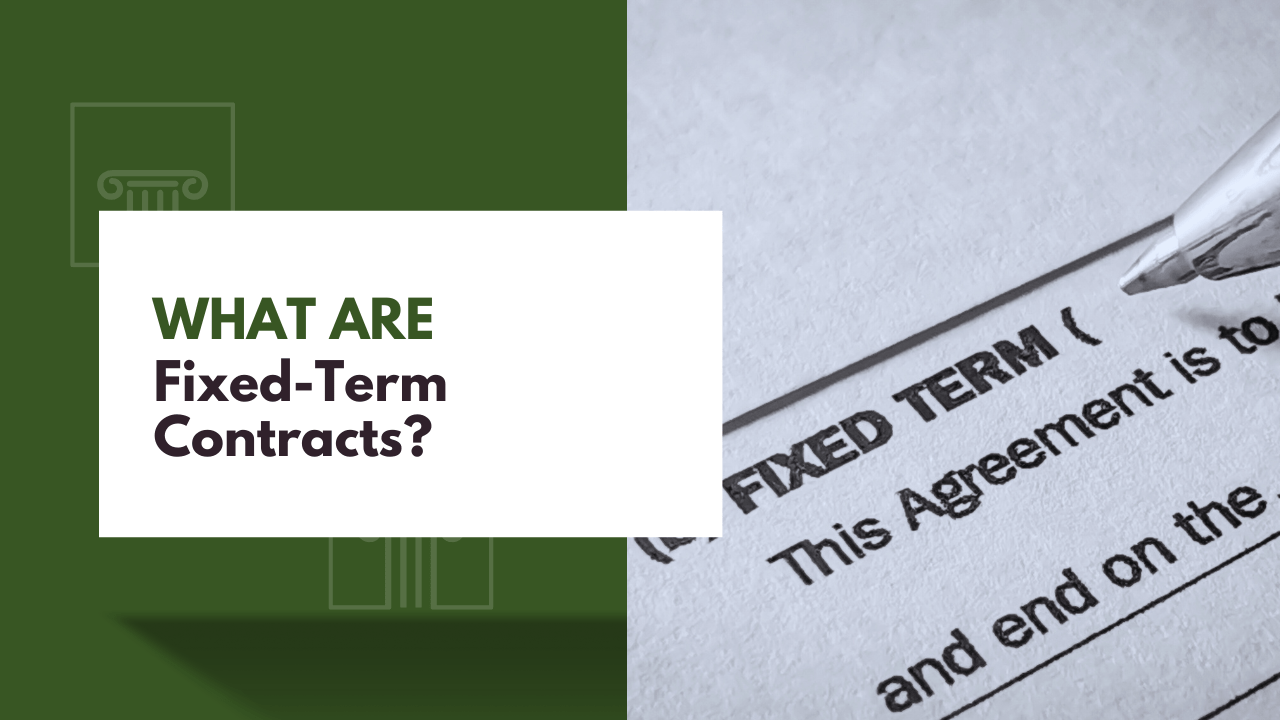
Saad Mirza
Hi! beautiful people. I`m an authtor of this blog. Read our post – stay with us

Saad Mirza
May 15, 2025
What are Fixed-Term Contracts?
Not every job is meant to last forever – and that’s where fixed-term contracts come in. Understanding fixed-term contracts is crucial for both employees and employers, as these arrangements come with unique rights, obligations, and risks under Canadian employment law.
A fixed-term contract is an employment agreement that sets a clear end date or specifies that employment will end when a defined task is completed. Unlike indefinite employment, which continues until either party decides to end it, fixed-term contracts are designed to be temporary from the outset.
They’re common in situations like covering a parental leave, completing a short-term project, or hiring extra hands during a busy season. What makes fixed-term contracts distinct from indefinite ones is this built-in expiry.
For example, we recently helped a client who was hired to manage a six-month marketing campaign for a local business. Both sides understood that the job would wrap up when the campaign ended. That clarity can be helpful – but it also means the rights and risks are different.
How Long Is a Fixed-Term Contract?
There’s no set legal minimum or maximum length for a fixed-term contract in Canada. The term is whatever the parties agree to: six months, twelve months, or tied to a project’s completion. Sometimes, a contract is renewed if the work continues, but here’s where things get tricky.
If you keep renewing fixed-term contracts back-to-back, the law may eventually treat the arrangement as permanent employment, with all the protections and entitlements that come with it. I’ve seen cases where an employer rolled over one-year contracts for several years, only to discover that their “temporary” worker was now entitled to the same notice and severance as a permanent employee.
Can an Employee Terminate a Fixed-Term Contract?
Employees sometimes want to leave before the contract ends. While that’s possible, it’s not always simple. Unless the contract includes a termination clause allowing early exit, leaving early can be a breach of contract, making the employee liable for damages to the employer.
I always advise clients, on both sides – to read the termination clause carefully. If there’s no clause, common law may still require the departing employee to compensate the employer for losses caused by the early departure. The best practice is to clarify these terms upfront, so everyone knows their rights and risks.
Employee Rights and Benefits Under a Fixed-Term Contract
Fixed-term employees in Ontario and across Canada are entitled to equal treatment under employment standards laws. That means:
• They must be paid at least minimum wage.
• They’re entitled to overtime, statutory holidays, and vacation pay.
• They pay into and are eligible for Employment Insurance (EI) and Canada Pension Plan (CPP) benefits.
However, long-term benefits – like extended health insurance or retirement plans – are typically only available if the contract specifically includes them. Human rights protections and health and safety laws apply to all employees, regardless of contract type.
Disadvantages of Fixed-Term Contracts for Employers
For employers, fixed-term contracts offer flexibility but come with real risks. If you end a fixed-term contract early without cause and without a valid termination clause, you may have to pay the employee for the entire remaining term – sometimes much more than what you’d owe a permanent employee in the same situation. For example, if a two-year contract is terminated after six months, the employer could be on the hook for the remaining 18 months of pay.
There’s also the risk of discouraging strong candidates who are seeking job security, and the legal danger of accidentally creating an indefinite employment relationship through repeated renewals or unclear contract terms. I’ve seen employers face costly wrongful dismissal claims after mishandling fixed-term contracts, especially when the contract language was ambiguous or failed to comply with the Employment Standards Act.
Legal Considerations for Employers
If you’re an employer considering a fixed-term contract, clarity is everything. Make sure your contract:
• Clearly states the start and end dates.
• Includes a well-drafted termination clause for early exits.
• Spells out renewal terms and any benefits provided.
• Avoids language that gives the employer “sole discretion” to terminate, as courts have struck down such clauses for violating employment standards.
It’s wise to have your contracts reviewed regularly, especially given how quickly the law evolves in this area.
Fixed-term contracts can offer flexibility and certainty for both employees and employers, but they also carry significant legal and financial risks. Whether you’re considering signing or offering a fixed-term contract, take the time to read and understand every clause.

Author: Saad Mirza
I’m Saad Mirza, the founder of Thrive Law, a employment law firm dedicated to helping employees across Ontario navigate challenging job terminations and workplace issues.

